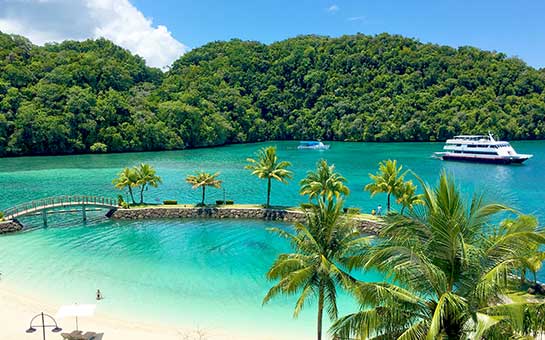Palau is part of Oceania, known for its turquoise waters, coral islands, and lush landscapes. The crown might belong to diving, but there is more to Palau than underwater activities. Kayaking, off-road exploration, and going on a tour of the island’s history are fulfilling as well.
Palau is a congregation of hundreds of islands that have stark white beaches, volcanic islands, and teeming forests. These clusters of islands have a rich cultural history, and despite western influences, they uphold the old ways. Before you leave to explore Palau, make sure to buy travel medical insurance as coverage against any unforeseen accidents, illnesses, or injuries that might occur during the trip.
Palau Travel Medical Insurance for International Travelers - FAQs
Everyone looks forward to an international trip, and any ailment can be a big letdown, but your health is a priority before the trip.
Falling sick abroad can cause a significant strain in finances. Travel medical insurance can make sure that your bills are handled with no financial stress on your part.
Do I need travel medical insurance for Palau?
It is not mandatory. But Palau is susceptible to climate change with the rising sea levels, not to mention other risks associated with the water and watersports. Palau is an island, and falling sick in a foreign land can be expensive.
Why buy travel medical insurance for Palau?
An exotic location with wildlife and jungles comes with a side dish of health risks. It could be a night of drinking, something you ate, or an injury during scuba diving that does you in. Whatever the cause of the health problems, you’ll be glad that you have travel health insurance when it occurs.
Get yourself insured and buy Palau travel medical insurance for peace of mind in case a health emergency arises.
Things to Do for Travelers in Palau
- Rock Islands: The Rock Islands of Palau are a UNESCO World Heritage Site. Colorful corals and marine life thrive in abundance in the waters of these islands. Raw nature comes alive under the stars at Palau, which makes this a great camping spot. The island’s shelter ruins date back to the World Wars and also serve as an excellent area for snorkeling and scuba diving. Make sure to go for the boat tours of the Rock Islands.
- Ngardmau Waterfall: Take a dip in the natural pool of the Ngardmau Waterfall, the tallest waterfall in Micronesia, which falls from Mt. Ngerchelchuus, also the highest peak in Palau. The almost 30-minute hike is worth the effort for the sight that awaits you. You can also check out Ngatpang Waterfall, which has a broader pool.
- Jellyfish Lake: This lake is often mistaken for a lagoon, but it is a saltwater body connected to the ocean. This lake is a migration path for many golden jellyfish, which makes for an enthralling sight if you go snorkeling. The jellyfish here are harmless, and it is the only marine lake open to the public for snorkeling.
- The Road Not Taken: Go for Palau's off-road jungle driving to explore Babeldaob and Koror's old military tracks. You can get guided tours for an expedition to discover an otherwise wild and inaccessible landscape of Palau.
- Milky Way Lagoon: Palau's Milky Way Lagoon makes for a good kayaking trip. The milky blue water makes a good background for photos. You can indulge in white mud packs from Milky Way's silt limestone sea bed, rumored to have healing properties.
- And Much More: Home to World War ruins, it's worth squeezing in a history trail for a day or two while in Palau. You can also check out the Etpison Museum for everything on the history of Palau. Belau National Museum is worth checking, too, for its display of Micronesian artwork.
Travel Risks for International Travelers in Palau
Palau isn't a big hub for tourist attractions, but it does have many Taiwanese tourists due to diplomatic ties between the two countries. Palau is a safe place to travel for a visit.
Here a few areas you should be mindful of:
- Activity-Related Hazards: Sunburn is common, as you are likely to spend most of your time in the water. Wear protective clothing to protect yourself from sunburn. Some parts of the ocean have unrestrained sea predators, especially mangrove areas, so consult local authorities before swimming. There are also risks associated with scuba diving that involve high dive points and require some degree of expertise on your part.
- The Weather: Palau, like most of Micronesia, is a recipient of tropical cyclones and floods, so avoid booking your tickets during typhoon season. Also, exercise caution while snorkeling and scuba diving around the war ruins. The chances are negligible, but these ruins might contain explosive artillery.
- Food and Drinks: Palau is famous for its fruit bat soup—paniki—but make sure you confine yourself to trusted food joints or hotels. Tap water quality isn't the same at every location, so it's best to boil water before consumption.
- Curfews: The main commercial center of the chain of islands has most of the tourist facilities. This includes the current capital, Ngerulmud, and Koror. They have a curfew that contracts and expands between the weekdays and weekends.
- General Caution: Maintain your distance from the war ruins, and do not touch or remove any artifacts. The legal age to drink here is 21. Also, be aware that LGBTQ+ culture is illegal here; use your discretion accordingly if applicable to you.
Before You Travel to Palau...
Make sure you have all of your important travel documents with you. Your passport, visa, and important receipts should be either with you or tucked away in a secure location all the time.
We wish you an invigorating and safe trip to Palau. Be alert and cautious of your belongings—and yourself as well.

